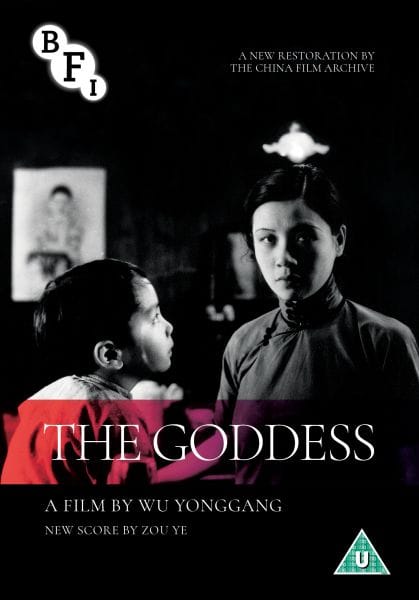
Following on from my report on the European premiere of Zou Ye’s Symphony Kūkai the other day, this pos presents another aspect of that composer’s art: film music. The Goddess (神女, Shénnǚ) is a film that premiered in Shanghai on December 7, 1934, telling the story of a young prostitute (the ‘Goddesss’ of the title) and how she gives her all for her son. But the ending – achieved via a story of cruelty – is tragic. With this idea of the ‘fallen woman,’ one might link the story to Verdi’s La Traviata, perhaps, especially as Dumas’ 1848 La dame aux Camilias was iconic in China at the time.
The star is Ruan Lingyu, who herself died tragically young, and 24 just the year after this film. She has been called the‘Chinese Greta Garbo’. Born in Shanghai in 1910 to a working lass family, times were hard – a massive parallel to the protagonist’s poverty in The Goddess. Her brief career found her nevertheless earring in 29 films. The Goddess dates vey much from er ‘late’ perdiod, therefore, along with New Woman (Cai Cushang, 1935). The Goddess is the story of a prostitute living with and abused by a gambler is a powerful one indeed. Adverse stories in the media in Ruan Lingyu’s life echo the way the character’s boy son in the story is treated when he goes to school and the mothers of the other children discover the ‘Goddess’s occupation. Despite the advocacy and clemency of a school official, the child is still expelled; the Goddess goes on to murder her gambling-addicted lover and the film ends with her in a jail cell.
The film is directed by Wu Yonggang (1908-1982) The term ‘Goddess’ was used as a euphemism for prostitute in 19e0s Shanghai; the irony of the term is seen in an early shot of an Art Deco representation naked woman , bound, and leaning over a naked child. Hardly the modern conception of a Goddess. – here it is more a play on the Confucian archetype of a virtuous wife and good mother. the basis of the “New Life Movement” of 1934.
You can access the complete film with Zou Ye’s music and with subtitles (for the inter titles that offer written commentary in Chinese) here:. .
In this educational video, the speaker introduces the film, contextualises it and examines the moral aspects from a variety of angles:
and the second offers a scene-by-scee commentary on th film itself:
There is a full course on early Chinese cinema, including full videos of the relevant films, available here, for free … given the similarities in plot, paericularly as regards using victims for malicious ends, perhaps the 1937 film Street Angels is the next logical step. This film feature does feature music, including a notably Ivesian cacophony right at the start:
So what of the added music to The Goddess? Possibly, like many Westerners in Westminster Hall the other night, I came at Kūkai Symphony from a purely musical angle, shorn of cinematic context. Hearing Zou Ye’s soundtrack to The Goddess fills in a lot of gaps: the long, lyrical, singable melodies, the lightness of touch. For this latter, try the depiction of sweet domesticity between mother and son around the 27-minute man as the son returns home, the strings light as a feather. This is a good example generally, as shortly thereafter a sequence of woodwind solos alternate with solos for violin and cello (all recognisable from the Symphony). Or around 41 minutes in, the intensification of energy via a martial side-drum, suddenly juxtaposed with a saccharine-sweet solo violin. A plaintive bassoon at one point seems to reflect the protagonist’s vulnerability; a harp invites to to compassion as she examines the marks left on her arm by the bully who will come to dominate her life.
Silence is used effectively and only very occasionally. But when it comes, it really hits home. its placement carefully considered.
The musical performance is superb – you need to dig deep into the notes to find that the musicians are the Chinese Philharmonic Orchestra conducted by the composer. No surprise the pacing is superb and finely integrated with video. Melodies of course have an authentically pentatonic bent. Most of all, the music complements the film superbly. The feel of scenes is perfect, as are the reflections of characters’ emotions. Hope is as effectively etch as catastrophe.
The transfer on the BFI DVD release is exceptional: a joy to watch.
The film is available (with soundtrack) at Amazon here.




.jpg?w=670&resize=670,446&ssl=1)


%20Craig%20Fuller.jpg?w=160&resize=160,160&ssl=1)
